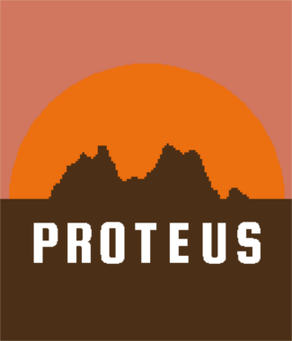
Jason Rohrer is an American computer programmer, writer, musician, and game designer. He publishes most of his software into the public domain and charges for versions of his games distributed on commercial platforms like the iPhone appstore or Steam. He is a graduate of Cornell University. From 2004 until 2011 he practiced simple living, stating in 2009 that his family of four had an annual budget of less than $14,500. They have since relocated from Las Cruces, New Mexico to Davis, California. In 2005 Jason Rohrer worked on a local currency, called North Country Notes (NCN), for Potsdam, New York. In 2016 Rohrer became the first videogame artist to have a solo retrospective in an art museum. His exhibition, The Game Worlds of Jason Rohrer, was on view at The Davis Museum at Wellesley College until June 2016.

Antichamber is a first-person puzzle-platform game created by Australian developer Alexander "Demruth" Bruce. Many of the puzzles are based on phenomena that occur within impossible objects created by the game engine, such as passages that lead the player to different locations depending on which way they face, and structures that seem otherwise impossible within normal three-dimensional space. The game includes elements of psychological exploration through brief messages of advice to help the player figure out solutions to the puzzles as well as adages for real life. The game was released on Steam for Microsoft Windows on January 31, 2013. A version originally sold with the Humble Indie Bundle 11 in 2014 added support for Linux and OS X.

An indie game, short for independent video game, is a video game typically created by individuals or smaller development teams without the financial and technical support of a large game publisher, in contrast to most "AAA" (triple-A) games. Because of their independence and freedom to develop, indie games often focus on innovation, experimental gameplay, and taking risks not usually afforded in AAA games. Indie games tend to be sold through digital distribution channels rather than at retail due to a lack of publisher support. The term is synonymous with that of independent music or independent film in those respective mediums.

Machinarium is a puzzle point-and-click adventure game developed by Amanita Design. It was released on 16 October 2009 for Microsoft Windows, OS X, Linux, on 8 September 2011 for iPad 2 on the App Store, on 21 November 2011 for BlackBerry PlayBook, on 10 May 2012 for Android, on 6 September 2012 on PlayStation 3's PlayStation Network in Europe, on 9 October 2012 in North America and on 18 October 2012 in Asia, and was also released for PlayStation Vita on 26 March 2013 in North America, on 1 May 2013 in Europe and on 7 May 2013 in Asia. Demos for Windows, Mac and Linux were made available on 30 September 2009. A future release for the Wii's WiiWare service was cancelled as of November 2011 due to WiiWare's 40MB limit.

Dear Esther is an adventure video game developed and published by The Chinese Room. It was originally released for Microsoft Windows in February 2012 and OS X in May 2012. Ports for PlayStation 4 and Xbox One were released by Curve Digital in September 2016. First released in 2008 as a free-to-play modification for the Source game engine, the game was entirely redeveloped for a commercial release in 2012. Featuring minimalistic gameplay, the player's only objective in the game is to explore an unnamed island in the Hebrides, Scotland, listening to a troubled man read a series of letters to his deceased wife. Details of her mysterious death are revealed as the player moves throughout the island.

Retro/Grade is a video game developed by 24 Caret Games. The game is about ace pilot Rick Rocket, who must repeat his last space battle in reverse in order to protect the space time continuum. The game play is rhythm-based and timed to original music by Skyler McGlothlin. In January 2009, it was nominated for two Independent Games Festival awards: Excellence in Audio and Excellence in Design. In October 2010, it won the Audience Choice Award at IndieCade.
PixelJAM Games is an American independent video game studio run by Richard Grillotti, Miles Tilmann and A.D. Bakke, known for their pixellated Flash games that "toy with traditional genres, but have quirky ideas and touches." Their most notable games include Dino Run, Gamma Bros, and Potatoman Seeks the Troof.

Edmund Charles McMillen is an American video game designer and artist. He is known for his Adobe Flash games with unconventional visual styles. His works include 2010's side-scroller Super Meat Boy, 2011's roguelike game The Binding of Isaac, and its 2014 remake, The Binding of Isaac: Rebirth.
Amanita Design is a Czech independent video game developing company founded in 2003 by Jakub Dvorský and headquartered in Brno, Czech Republic. The company has created award-winning games including Machinarium, the Samorost series and Botanicula, as well as educational and advertising minigames and animations, all using Adobe Flash. Clients include BBC, Nike and The Polyphonic Spree.
VVVVVV is a 2010 puzzle-platform game created by Terry Cavanagh. In the game, the player controls Captain Viridian, who must rescue their spacecrew after a teleporter malfunction caused them to be separated in Dimension VVVVVV. The gameplay is characterized by the inability of the player to jump, instead opting on controlling the direction of gravity, causing the player to fall upwards or downwards. The game consists of more than 400 individual rooms, and also supports the creation of user-created levels.

Cogs is a puzzle video game released in 2009 by Lazy 8 Studios, originally released as a Microsoft Windows title, but receiving subsequent ports to other operating systems, mobile platforms, and game consoles. The game requires the player to manipulate a three-dimensional object's sides as sliding block puzzles as to complete specific goals, such as meshing gears to complete a clockwork mechanism or routing gas flow through pipes to a balloon.

The Stanley Parable is a story-based video game designed and written by developers Davey Wreden and William Pugh. The game carries themes such as choice in video games, the relationship between a game creator and player, and predestination/fate.

Philippe Poisson, better known as Phil Fish, is a French Canadian former indie game designer best known for his work on the 2012 platform game Fez. He was born and raised in Quebec, where his experiences with Nintendo games in his youth would later influence his game design. He studied game design at the Montreal National Animation and Design Centre, and worked at Ubisoft and Artificial Mind and Movement before starting Polytron in 2008.

Guacamelee! is a Metroidvania action platforming video game developed and published by DrinkBox Studios, initially launched in April 2013 for platforms PlayStation 3 and PlayStation Vita and was later ported to Windows in August and to OS X and Linux in February 2014. The enhanced Super Turbo Championship Edition was released for Wii U, Windows, PlayStation 4, Xbox One, and Xbox 360 in July 2014 and later on the Nintendo Switch in October 2018. The game is inspired by traditional Mexican culture and folklore, like alebrijes and Day of the Dead.

Proteus is a 2013 exploration and walking simulator video game designed and created by Ed Key and David Kanaga for Microsoft Windows, OS X, Linux, PlayStation 3, and PlayStation Vita. In the game, the player traverses a procedurally generated environment without prescribed goals. The world's flora and fauna emit unique musical signatures, combinations of which cause dynamic shifts in audio based on the player's surroundings.

Cart Life is a simulation video game developed by Richard Hofmeier using Adventure Game Studio for Microsoft Windows released in 2010. The game was added to Steam in March 2013 but later removed when Hofmeier released the full source code for free.

Adam Saltsman, also known as Adam Atomic, is an American indie video game designer best known for creating the endless runner Canabalt. He is a founder of Semi Secret Software and Finji video game studios.

Solar 2 is an open world sandbox video game developed by Australian developer Jay Watts' video game studio, Murudai. It was released on 17 June 2011 on Steam for Microsoft Windows and on 19 June 2011 on Xbox Live Indie Games for the Xbox 360. The game was developed with Microsoft's XNA tools, and its development was inspired by indie games such as flOw. The game follows the player in their mission to accumulate enough mass to become several astronomical objects, eventually becoming a Big Crunch, which then produces a Big Bang.

Hundreds is a puzzle video game where players touch circles to make them grow without overlapping. In the game's 100 levels, the player interacts with different types of circles to bring a counter to the number 100. The game was developed and published by Semi Secret Software in collaboration with Greg Wohlwend and was released for iOS on January 7, 2013, and on Android later that year.

Starseed Pilgrim is a 2013 puzzle-platform game from independent developer droqen. Players plant 'starseeds' which grow into plants, each with different growth patterns and interaction mechanics. Players plant these starseeds on floating platforms and on fully-grown plants in order to traverse the game world. The game was developed in Adobe Flash and was released in April 2013 for Windows and OS X. Reviewers praised Starseed Pilgrim's game mechanics and the process of learning their interactions, but criticized the learning curve as steep. The game was a finalist for the Excellence in Design award at the 2013 Independent Games Festival.
















